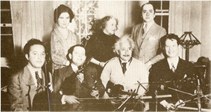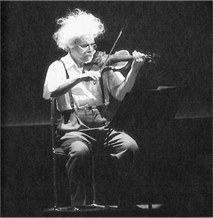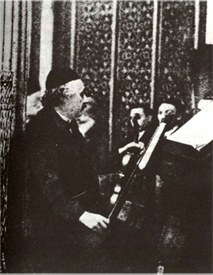Music
Texts by Dr. Antonio Moreno González
Einstein was influenced by his mother's musical gifts At the age of six he had already mastered the violin and it was to remain his favourite musical instrument for the rest of his life. Music and science were his two great passions. When he travelled he would take his violin ("Lina") with him, in the hope that there might be a chance to play something by his favourite composers, alone or in company. He seized any opportunity to immerse himself in music, playing with fellow scientists, people from his neighbourhood or anyone who offered him the chance. He took part in public and private concerts, played the organ at synagogues and on more than one occasion contributed with his music to raising funds for the Zionist cause.
His favourite composers were Mozart, Bach, Schubert, Vivaldi, Corelli and Scarlatti. He was not so keen on Beethoven, whom he considered to be too dramatic and personal. He had varying opinions on other composers, but the one he most opposed was Wagner, although he did appreciate his contribution to the new forms of opera.
After work he would relax, sometimes playing in the kitchen so as not to bother the neighbours:
"First I improvise and if that doesn't help, I seek consolation in Mozart; but when I am improvising and I feel I am achieving something, I need the clear constructions of Bach to get to the end."
In 1950, his doctor ordered him to stop playing the violin and he turned to the piano instead--an upright Bechstein. On occasions passers-by would listen in with pleasure. His violin was inherited by his grandson Bernhard Caesar, son of Hans Albert.
Einstein was on good terms with the Spanish cellist Pau Casals (1876-1973). As well as their music, they were united by their opposition to tyranny against nations. Casals, who had rebelled against the Franco dictatorship of which he himself was a victim, said to Einstein: "The only weapons I have are the conductor's baton and the cello: they are not lethal, but I have no other. With them I protest against anything I consider ignominious for mankind". It was an attitude which earned Einstein's praise: "What I most admire in him is his firm stance, not only against the oppressors of his people, but also against all the opportunists who are ever ready to make a pact with the devil. I see clearly that the world is threatened not so much by the wrongdoers themselves, but more by those who condone evil and allow it to be done". It should be remembered that Einstein had come out in favour of the Spanish Republic, unconcerned that he might cast a bad light on the policies of the British, French and American governments, who maintained an arms embargo against the republican army for fear of losing Catholic votes in their respective countries.
As one might expect, has also inspired music: there are groups that bear his name, he is quoted in a number of songs and in 1975 Philip Glass wrote the opera Einstein on the Beach where the most important musical instrument is the violin, with the violinist appearing characterised as Einstein.

Musical evening at Princeton

The violinist of the opera Einstein on the Beach by Philip Glass

Einstein in a synagogue
